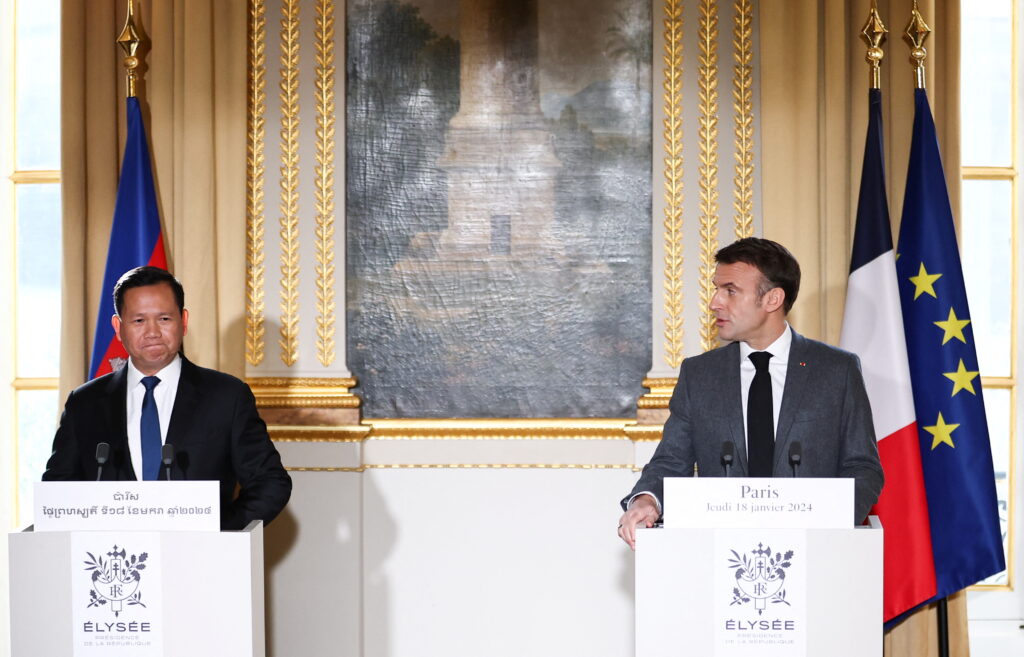In just 13 months, the Cambodia–France bilateral relationship has experienced a rapid transformation. The government of new Cambodian Prime Minister Hun Manet has continued its predecessor’s strategic overture to France with rigour. Meanwhile, under President Emmanuel Macron France has embraced Cambodia, aiming to boost its economic, cultural and diplomatic influence in the country and in the ASEAN bloc more broadly as part of Macron’s tilt towards the Indo-Pacific.
Between December 2022 and January 2024, there have been three official visits by Cambodian leaders to France, including by former prime minister Hun Sen, King Norodom Sihamoni and most recently Prime Minister Manet. Notably, France is the first European country Manet has officially visited since taking office in August 2023.
Manet’s visit to France concluded with commitments from both sides to bolster trade, investment and defence cooperation. France expressed its support for Cambodia’s 2050 carbon neutrality plan and the two countries reiterated a mutual desire to deepen cultural exchanges buttressed by their Francophile bonds.
But the most significant outcome of the visit was an agreement to strengthen the bilateral relationship aimed at elevating it to a strategic level. Although details about the scope and timeline of the planned ‘strategic’ upgrade remain to be seen, this elevation will make France Cambodia’s fourth strategic partner after Thailand, China and Japan.
Since 2021, Cambodia has pushed for a whole-of-government implementation of its Economic Diplomacy Strategy (EDS) 2021–2023. The strategy aims to attract and diversify global trade, tourism and foreign direct investment, with a new iteration of the EDS currently being developed for the 2024–2028 period.
Cambodia views France as a major European partner in these endeavours. Though two-way trade at the end of 2023 sat at just US$542 million, Cambodia has enjoyed a sizable trade surplus and is stepping up economic ties with France to attract greater private sector investment in aviation, tourism, railways, renewable energy and digital technology. This was reflected in Manet’s meetings with companies like VINCI Group, TotalEnergies, Accor Group and Alstom during his Paris trip. France can serve as a bridge to increase exports of Cambodian agricultural products and garment goods to the EU market.
Another factor driving Phnom Penh towards Paris is foreign policy. Cambodia is aiming to strike a more delicate balance between major players and establish a stronger European footing in its strategy. France is a viable global partner for Cambodia in supporting international law and multilateralism, which have begun to come under increasing pressure. Cambodia’s principled stance against the war in Ukraine, its co-sponsorship of UN General Assembly resolutions condemning Russia, its backing for Ukraine’s fast-tracked accession to ASEAN’s Treaty of Amity and Cooperation and its demining support for Ukraine align with France’s position.
Deeper relations with France could buttress Cambodia’s political and economic ties with the European Union, which became rocky following the bloc’s partial withdrawal of its preferential trade agreement under its Everything But Arms scheme in 2020.
At the regional level, the two countries agree that deepening ASEAN–France relations is key to aligning France’s Indo-Pacific Strategy with the ASEAN Outlook on the Indo-Pacific to promote common interests in regional connectivity, maritime security and sustainable development. For France, Cambodia is an important partner in pushing for a more assertive presence in mainland Southeast Asia and in engaging with ASEAN amid China’s growing influence in the region.
The overture to France also serves domestic messaging purposes. Since taking office in August 2023 Manet has had his work cut out for him, grappling with issues from reviving the economy after the emergence of COVID-19 and mounting geopolitical uncertainties to domestic reforms. To be embraced by France, a nuclear-armed power and a de facto EU leader, sends a powerful message to domestic stakeholders waiting to see what the new, Western-educated leader is planning for the country. It also helps take the wind out of the sails of Cambodian opposition groups, especially those based in Europe, who have questioned the legitimacy of Manet’s ascent to power.
Cambodia’s strategic overture to France under its new government stems from economic, geopolitical and domestic political imperatives. Although ties between the two countries have existed for 180 years, the significant increase in tempo and depth since 2022 underscores Cambodia’s desire to establish a stronger European footing in its foreign policy. France’s reciprocal embrace of Cambodia reveals its aim to bolster its influence in the ASEAN region and the Indo-Pacific more broadly.
The planned elevation of Cambodia–France relations to a strategic level presents an emerging dynamic in Cambodia’s foreign policy under Hun Manet.
Chansambath Bong is a PhD scholar at the Strategic and Defence Studies Centre at The Australian National University and a Research Fellow at the Asian Vision Institute, a policy think tank based in Cambodia.

